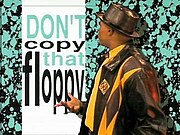Don't Copy That Floppy
From Wikipedia, the free encyclopedia
| This article needs additional citations for verification. Please help improve this article by adding reliable references (ideally, using inline citations). Unsourced material may be challenged and removed. (May 2008) |
Don’t Copy That Floppy was an anti-copyright infringement campaign run by the Software Publishers Association (SPA) beginning in 1992[1], and has become popular[1] due to the advent of sites such as Google Video and YouTube.
The video for the campaign, starring M.E. Hart as “MC Double Def DP,” was filmed at Cardozo High School in Washington, D.C. and produced by cooperation between the SPA, the Educational Section Anti-Piracy Committee, and the Copyright Protection Fund, in association with Vilardi Films.[citation needed]
[edit] Synopsis
Two teenagers, Jenny (played by Marja Allen) and Corey (played by Jimmy Todd), are playing a game on a classroom computer. Corey is exuberantly pushing keys to show the viewer that he is heavily immersed in the game action; Jenny is beating him. Frustrated, he asks for a rematch, but she has an upcoming class and must leave. He decides he will copy the game so that he can play it at home. Upon inserting his blank floppy disk into the Apple Macintosh LC a video pops up on the computer. This video is of a rapper named MC Double Def Disk DP the "Disk Protector". The DP’s role is instructional and his method of lecture is a hip-hop style song and dance.
The point of the video is the message that copyright infringement of software will cause the computer and video game industry to lose profit, resulting in halted production of further computer games. (The games the video chooses as examples—The Oregon Trail, Tetris, and the Where in the World is Carmen Sandiego? series—are among the most successful and bestselling games of the late-1980s to mid-1990s).
The rap video portion is interspersed with interviews of artists, writers, programmers and a lawyer. These people are the staff responsible for design of an early version of the game Neverwinter Nights (then an America Online MMORPG) and allows them to explain the issue in greater detail:
- Craig Dykstra—America Online—Manager Developer Support
- Dave Butler—America Online—Director Platform Software Development
- Janet Hunter—America Online—Senior Systems Analyst
- Ilene Rosenthal—Software Publishers Association—Attorney
They explain how games are made, indicating that creating a game can involve 20 to 30 people integrating the various parts, and working on documentation, technical support, and marketing. The point they try to raise is that if sales are low, the authors may decide that the game is unpopular and stop making it.
At the end of the video the DP fades away, leaving the children to decide for themselves whether they will copy the floppy—they decide against it. Corey, who has some money left over from his summer job, decides that he will buy the game. Jenny agrees and jokes that Corey’s game will even come with a manual.
[edit] References
- ^ a b "Don't Copy That Floppy" (in English). Edge (Future Publishing): p. 91. Christmas 2003 (Issue 131).



